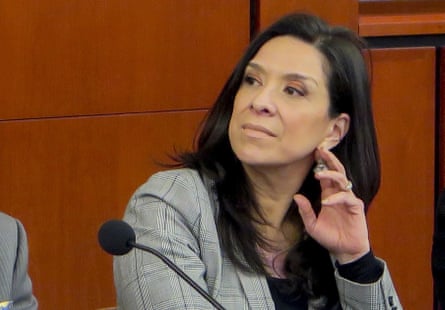A judge whose son was murdered by a disgruntled lawyer posing as a pizza deliveryman voiced anguish that the crime has spawned a spate of copycat threats against other jurists.
Esther Salas, a US district judge for New Jersey, fought back tears on Thursday after being asked to respond to a trend of judges receiving home pizza deliveries with the name of her late son attached as a means of intimidation.
Salas’s son, Daniel, then aged 20, was shot dead on his doorstep on 19 July 2020 by a man who had ostensibly been delivering a pizza to his family’s home. Her husband, Mark, survived critical injuries after being shot multiple times in the attack.
The suspect, Den Hollander, an attorney who was subsequently found dead from a self-inflicted gunshot wound, had earlier appeared in Salas’s court in a case which he lost.
“I’m probably a little more emotional today than ever, because we’re in July,” she told a webinar, titled Speak Up for Justice, discussing the rising tide of violent threats against judges. “July is a hard month because Daniel would have been 25 on July 13, and we celebrated his murder – not celebrated, had to endure the anniversary of his murder, his fifth anniversary, on July 19.”
“Then to hear that my beautiful son’s name, everything that Danny stands for is love and light – and to hear people using it as a weapon, weaponizing his name to inflict fear,” she added.
Thursday’s forum was held to address an intensifying atmosphere of menace and intimidation that judges describe facing since Donald Trump returned to the White House in January. It included judges who had been threatened directly after ruling against some of Trump’s most contentious policies and executive orders. Several participants called the current hostile environment “unprecedented”.
Salas was speaking after two fellow judges, John McConnell, a US district judge from Rhode Island, and Robert Lasnik, who sits on the western district of Washington, said they had both received pizzas in Daniel’s name.

McConnell described receiving a threatening voice message calling for his assassination after arousing anger among Donald Trump’s supporters with a ruling that blocked the president’s attempt to freeze funding to states. The expletive-laden recording was played to the webinar.
McConnell’s ruling led to articles being lodged in Congress calling for his impeachment. A wanted poster with his face and name on it was placed inside the US Capitol, apparently by a member of Congress.
McConnell said his court had received about 400 or 500 “vile phone” calls following the ruling – which triggered a formal complaint by America First Legal, an advocacy group founded by Trump’s deputy chief of staff, Stephen Miller as well as six credible death threats.
He was initially puzzled by the unexplained pizza deliveries until the US marshalls, which protect members of the federal judiciary, explained it, prompting him to call Salas.
“They wanted to let us know that they knew where we lived,” McConnell said. “The most devastating, the most heartbreaking call I’ve ever had to make was when the marshals called me and told me that a pizza had been delivered in … Daniel’s name. I didn’t want to make that call. But I called my friend Esther because I thought she needed to know what was going on and we had a good cry over it.”
He added: “Someone was on the dark web, searching for my home address, because - this a quote, ‘He wanted Smith and Wesson to pay me a visit at my home.’”
Lasnik said pizzas had been delivered to his home in Seattle while two of his adult children, who lives in different cities, had also received deliveries – all in Salas’s son’s name – after he went on national media to criticize the climate of intimidation aimed at judges.
“What’s the message to Judge Lasnik? We know where you live. We know where your children live and they could end up dead just like Judge Salas’s son. That’s a pretty cruel thing to do.”
Pizzas had been sent to “upwards of 50” judges, he told the forum.
Referring to the threats against judges generally, he said: “They would make a ruling, they would be bombarded with hate mail and hate emails and threats. And it’s so discouraging to a young judge to suddenly not only worry about, how do I do this job, right, but how do I keep my family safe?”
John Coughenour, also a judge from Washington and who issued a preliminary injunction against Trump’s executive order limiting birthright citizenship, described how local sheriff’s officers arrived at his home with weapons drawn following a “swatting” call falsely stating he had murdered his wife.
John Roberts, the chief justice of the US supreme court has twice spoken out against threats against judges in recent months, warning that it is undermining the rule of law. He warned against the trend in his end of year report in 2024, and reiterated it at a forum in North Carolina last month, voicing fears that it could lead to violence.
While there have been past criticisms of Democratic rhetoric against rulings – notably against Chuck Schumer, the party’s leader in the Senate – Trump and his supporters have raised the ante since his inauguration in January. Judges have been repeatedly assailed as “radical”, “Marxists”, or faced calls for their impeachment over rulings that stymied administration policies.
Salas said the current climate went beyond previous threat levels.
“We’ve seen it come from both sides, but now it’s at a level that I have to honestly say … is different,” she said. “We’re seeing things coming out from the top down, from White House spokespeople calling us crazy leftist, unconstitutional judges. That’s the difference. We are nonpartisan, but we have to speak the facts.
“And the facts are that we have political leaders with large social platforms, with power calling us deranged and idiots. It’s wrong whoever does it, whatever side you sit on.”
Additional reporting by Sam Levine

 German (DE)
German (DE)  English (US)
English (US)  Spanish (ES)
Spanish (ES)  French (FR)
French (FR)  Hindi (IN)
Hindi (IN)  Italian (IT)
Italian (IT)  Russian (RU)
Russian (RU)  16 hours ago
16 hours ago
























Comments